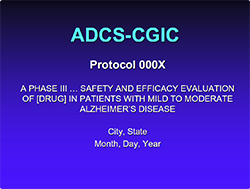CGIC or ADCS-CGIC:
One of the most common global change form used in Alzheimer’s disease trials.
Clinical Global Impression of Change (CGIC)
CGIC scales have been used extensively as primary outcomes in phase 2 and 3 clinical trials for Alzheimer disease, mild cognitive impairment, and for cognitive enhancers. A CGIC score is intended to be used as a measure of clinically meaningful change, as distinct from an instrument’s ability to assess any change. Although CGIC ratings are less precise and consistent than psychometric measures, they may be more sensitive to clinically meaningful effects, and, therefore, can serve as useful measures of clinical utility. The process called the CIBIC+, or clinician’s interview-based impression of change with caregiver input (that’s the +) is the FDA required approach to obtaining a global rating; and the ADCS-CGIC, the Alzheimer’s Disease Cooperative Study – Clinical Global Impression of Change is the most commonly used process for obtaining an assessment of clinically meaningful change in clinical trials. The ADCS-CGIC is a systematic method for assessing clinically significant change in a clinical trial as viewed by an independent skilled and experienced clinician. The ADCS-CGIC focuses on clinicians’ observations of change in the patient’s cognitive, functional, and behavioral performance since the beginning of a trial. It relies on both direct examination of the patient and interview of informants. Unlike a targeted symptom scale, it takes into account a subject’s overall function in the cognitive, behavioral and functional activity domains. Scoring is based on an interview with the caregiver and examination of the patient by an independent evaluator, without consulting other information such as cognitive test results. The ADCS-CGIC requires the assessor to consider a number of cognitive, functional, and behavioral areas prior to providing an overall “global” assessment of clinical change. It was designed in response to an FDA request and on the basis of a survey of Alzheimer Disease Cooperative Study clinicians. It is performed by interviewing the patient to assess function and mental status and the informant, using a worksheet that comprehensively lists relevant symptoms potentially useful in judging clinically meaningful change, and allows for notes for future reference- it takes approximately 20 minutes per interview.
Schneider LS, Olin JT, Doody RS, Clark CM, Morris JC, Reisberg B, Schmitt FA, Grundman M, Thomas RG, Ferris SH.
Olin JT, Schneider LS, Doody RS, Clark CM, Ferris SH, Morris JC, Reisberg B, Schmitt FA.
MILD COGNITIVE IMPAIRMENT
Schneider LS, Raman R, Schmitt FA, Doody RS, Insel P, Clark CM, Morris JC, Reisberg B, Petersen RC, Ferris SH.
Schneider LS, Clark CM, Doody R, Ferris SH, Morris JC, Raman R, Reisberg B, Schmitt FA.
ADCS-CGIC Request
Dear Health Care Professionals and/or Students,
Thank you for your interest in the measure and article reprint of the ADCS-CGIC and the CIBIC+. Before we grant you permission to use the ADCS-CGIC and CIBIC+ and provide you with a free download of related material, we would like to request some information and assurances from you.
(If you are a student or are contacting us for a professional, the Request Form should be filled out by the professional supervisor and sent from his or her email address.) After the professional person in charge has submitted an adequately filled out the Request Form, we shall grant permission to use the ADCS-CGIC and the CIBIC+ and send a link for the free downloads.
The ADCS-CGIC and the CIBIC+ is for professional use only, not to be made accessible by the general public. Do not redistribute the downloaded material; instead, tell interested parties to contact us and complete their own request form and we will send the download link directly to them.
Sincerely,
Lon Schneider, M.D.
Professor of Psychiatry, Neurology, and Gerontology
Keck School of Medicine of USC
Los Angeles, CA 90033
Tel 323 442 7600 Fax 323 442 7601
email: lschneid@usc.edu
www.usc.edu/memory
